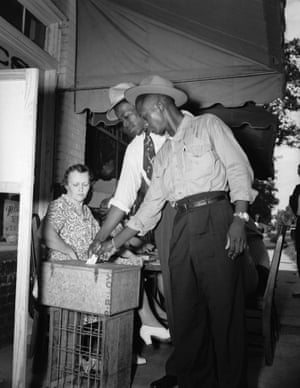
The researchers looked at more than 1,000 Alabama felons who had completed any prison terms and periods of probation or parole to which they had been sentenced. They found that about 75% of them still owed legal financial obligations, meaning they could not regain the right to vote even if they would otherwise be able to do so.
Marc Meredith, an associate political science professor at the University of Pennsylvania, was one of the studys co-publishers. He said in a phone interview last month that Alabamas policy requiring the payment of fines, fees and restitution prior to the restoration of voting rights has had a significant impact on the electorate in the state.
People should be aware of the share of people disenfranchised by policies like this and how much money people have to pay before they can get their voting rights back, he said. Even with people who are 15 years removed from their conviction, the majority of them cant vote because of their financial obligations.
Jim Crow 2.0
Of the more than 280,000 disenfranchised felons in Alabama, 143,924 are black, according to the Sentencing Project. That means that disenfranchised felons make up 15.11% of the states voting-age African American population.
And black felons are 9.4% less likely to be eligible to vote in Alabama because of outstanding fines, fees and restitution, according to the June study in the Journal of Legal Studies.
[W] e find that black defendants are significantly more likely to be ineligible to restore their voting rights due to [legal financial obligations] , the study states. Together these findings suggest that [legal financial obligations] are a general threat to racial equality above and beyond the forces of mass incarceration.
Alexandria Parrish, an attorney with Evans Law Firm in Homewood, has years of experience representing clients who have been criminally disenfranchised. She sees the practice as a way to keep poor and black people away from the ballot box.
Theyve got so many ways of skinning a cat, and I think most of it is to keep people from being able to vote so they can vote their own people in, she said. This is like Jim Crow 2.0. They can keep them from voting.
Deuel Ross, assistant counsel at the NAACP Legal Defense and Educational Fund in New York, said that the fact that Alabama links voting to the ability to pay has a disparate impact on black felons that indirectly suppresses the vote of African Americans who are not felons.
Youre seeing large numbers of African Americans being unable to vote, he said. And theres this idea of community contagion. The way its been used before by the Legal Defense Fund is to describe the idea that once you have a large percent of the population 10, 15% of the population being unable to vote because of felon disenfranchisement laws, it begins to impact a larger percent of the population If your mother or father cant vote, you never learn the importance of voting.
Carmone Owens said he considers the idea that someone could be barred from voting simply because they cannot afford to pay off their fees, fines and restitution to be the epitome of disenfranchisement.
Convicted of first-degree armed robbery in 2007, he was released on parole in 2015 after serving eight years of a 35-year prison sentence. The black Birmingham resident, who now advocates for felons rights, is not eligible to vote until 2042 unless he receives a full pardon and pays off his legal financial obligations.
The right to vote should never be tied to the level of ones debt, he said. Its a moral issue and if you want people to come back and transition back into society, one of the fundamental tenets of society is the right to be able to vote.
This story is published with Reckon by AL.com, an in-depth, socially focused initiative of Alabama Media Group, the states largest media company

